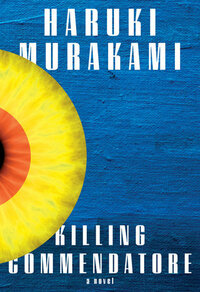You need to sign in or sign up before continuing.
Take a photo of a barcode or cover
challenging
dark
hopeful
mysterious
reflective
slow-paced
Plot or Character Driven:
A mix
Strong character development:
Complicated
Loveable characters:
Complicated
Diverse cast of characters:
No
Flaws of characters a main focus:
Yes
challenging
dark
mysterious
slow-paced
Plot or Character Driven:
A mix
Strong character development:
Complicated
Loveable characters:
Complicated
Diverse cast of characters:
Yes
Flaws of characters a main focus:
Yes
mysterious
slow-paced
Plot or Character Driven:
Character
Strong character development:
Yes
Loveable characters:
No
Diverse cast of characters:
No
Flaws of characters a main focus:
Yes
Haruki Murakami is at this point a certified genius and I need no more to gas him the fuck up. This book is magical realism at its finest. The edition I read had 682 pages and each page kept me hooked. It was very difficult for me to put this book down, I digested the information so quickly that I kept going back for more. However, if you are new to Murakami, this might be a bit difficult to get into. It takes a bit of experience with Murakami's work to be able to enjoy this book fully. I do not think it his best work but it definitely ranks high for me.
We follow an unnamed portrait painter who left his wife upon her request (she cheated on him) and travels around Japan for a while. He is a good painter and his work has gotten a bit of recognition among the type of people who get their portrait painted. Anyways, he ends up at the mountain top home of one of his friends, Masahiko Amada in Odawara. The home turns out to be the house where Masahiko's father Tomohiko Amada, the popular Japanese style painter had lived before he moved into a care home.
This is where our protagonist comes in contact with Tomohiko Amada's painting titled Killing Commendatore. This painting that he found opened a whole can of the unknown. Ideas and dreams take shape and the imagination is the scariest place. Everything heightens when a white haired Menshiki comes into the picture (the pun), asking our protagonist (henceforth named OP) to paint his portrait. OP had decided to stop painting portraits, Menshiki then lets OP have creative freedom to paint him however he saw him. The process of the painting led to secret revelations, underground holes, mysterious bells ringing, midnight philosophies and a painting-made-man.
While I can go on to explain the intricacies of this book. I believe if there is one thing to take away is that a lot of former Murakami themes were reused in this book. I loved the continues tie-in of the Opera Don Giovanni, which is where the title of the book comes from. All characters were easy to grasp, sex was raw and unabashed. I loved the way an idea was made reality and it just unleashes the essential formlessness of what we identify has real. I mean it might seem a bit childish to have a character from a painting come alive (and the character in no way comes alive, I believe it is just a stage of awareness, where internal monologue gains a voice that does not sound your own).
Childish as it might seem, I would be lying if I said I didn't believe the possibility of it (not just in the magical world but in the real world, where people put enough passion that they 'soulify' or animate their ideas and creation). It might seem childish but I remember a quote on the childishness of the world and how easy things seem from the eyes of a child In the eyes of a child, everything is a question and an answer nothing is too absurd.
Overall, the overarching theme is the strength of art and creation and the ability to transmit and materialize ideas for the creator, the created and the observer.
We follow an unnamed portrait painter who left his wife upon her request (she cheated on him) and travels around Japan for a while. He is a good painter and his work has gotten a bit of recognition among the type of people who get their portrait painted. Anyways, he ends up at the mountain top home of one of his friends, Masahiko Amada in Odawara. The home turns out to be the house where Masahiko's father Tomohiko Amada, the popular Japanese style painter had lived before he moved into a care home.
This is where our protagonist comes in contact with Tomohiko Amada's painting titled Killing Commendatore. This painting that he found opened a whole can of the unknown. Ideas and dreams take shape and the imagination is the scariest place. Everything heightens when a white haired Menshiki comes into the picture (the pun), asking our protagonist (henceforth named OP) to paint his portrait. OP had decided to stop painting portraits, Menshiki then lets OP have creative freedom to paint him however he saw him. The process of the painting led to secret revelations, underground holes, mysterious bells ringing, midnight philosophies and a painting-made-man.
While I can go on to explain the intricacies of this book. I believe if there is one thing to take away is that a lot of former Murakami themes were reused in this book. I loved the continues tie-in of the Opera Don Giovanni, which is where the title of the book comes from. All characters were easy to grasp, sex was raw and unabashed. I loved the way an idea was made reality and it just unleashes the essential formlessness of what we identify has real. I mean it might seem a bit childish to have a character from a painting come alive (and the character in no way comes alive, I believe it is just a stage of awareness, where internal monologue gains a voice that does not sound your own).
Childish as it might seem, I would be lying if I said I didn't believe the possibility of it (not just in the magical world but in the real world, where people put enough passion that they 'soulify' or animate their ideas and creation). It might seem childish but I remember a quote on the childishness of the world and how easy things seem from the eyes of a child In the eyes of a child, everything is a question and an answer nothing is too absurd.
Overall, the overarching theme is the strength of art and creation and the ability to transmit and materialize ideas for the creator, the created and the observer.
Maybe it’s the translation, but the writing style seemed even more direct and simplistic than Murakami’s other novels, to the point of being distracting.
The novel isn’t quite as “out there” as some of his others, as well.
The novel isn’t quite as “out there” as some of his others, as well.
Murakami masterstroke.
"Yet what was time, when you got right down to it? We measured its passage with the hands of a clock for convenience’s sake. But was that appropriate? Did time really flow in such a steady and linear way? Couldn’t this be a mistaken way of thinking, an error of major proportions?"
"Yet what was time, when you got right down to it? We measured its passage with the hands of a clock for convenience’s sake. But was that appropriate? Did time really flow in such a steady and linear way? Couldn’t this be a mistaken way of thinking, an error of major proportions?"
Definitely my least favorite Murakami book I’ve read. Feels like he recycles all the tropes and plot lines from his other books but none of them are used as artfully. Plus this is probably the worst offender for Murakami’s portrayal of women. Only really worth a read if you’re dedicated to reading all of his work, if not then he has way better for you to start with.
This is my third Murakami novel, and it's unfortunate that it's my least favourite. I felt the book lacked a compelling narrative hook; The opening chapters were slow and poorly paced, and unfortunately, that's how the majority of the novel felt. It really didn't need to be this long. The fact that there were large wads of exposition, the constant reiteration of things already known, and a plot that doesn't warrant 700 pages didn't help.
Even though I've only read a few of his books, I can recognise that the protagonist was very Murakami; the loneliness, the pity, and the love of western music and literature, it was all here. I'm not too familiar with his work that it annoyed me though, I did feel that the painter aspect of his characterisation brought individuality. The use of painting was something I enjoyed throughout, these scenes were always encapsulating. They served well for engaging scenes and as a way to physically represent the metaphors of the book.
My biggest criticism though is the sexualisation, it's just plain creepy. The physical descriptions, Mariye's obsession with her breasts, and the way that the women exist to help the subjective states of the males, it's all just disgusting.
Overall, I wasn't the biggest fan. The imagery and writing was vivid and encapsulating, characters like the Commendatore were entertaining and the central theme of painting was great. But the novel just didn't warrant it's length, seemed to wallow in its own use of metaphor too much and was really bogged down by its sexulisation
Even though I've only read a few of his books, I can recognise that the protagonist was very Murakami; the loneliness, the pity, and the love of western music and literature, it was all here. I'm not too familiar with his work that it annoyed me though, I did feel that the painter aspect of his characterisation brought individuality. The use of painting was something I enjoyed throughout, these scenes were always encapsulating. They served well for engaging scenes and as a way to physically represent the metaphors of the book.
My biggest criticism though is the sexualisation, it's just plain creepy. The physical descriptions, Mariye's obsession with her breasts, and the way that the women exist to help the subjective states of the males, it's all just disgusting.
Overall, I wasn't the biggest fan. The imagery and writing was vivid and encapsulating, characters like the Commendatore were entertaining and the central theme of painting was great. But the novel just didn't warrant it's length, seemed to wallow in its own use of metaphor too much and was really bogged down by its sexulisation
This is my second Murakami book but i can see a clear authorial voice. Dreamy fantastical reality with a few hypersexual "wtf?" moments sprinkled in.
Very well written.
Very well written.




